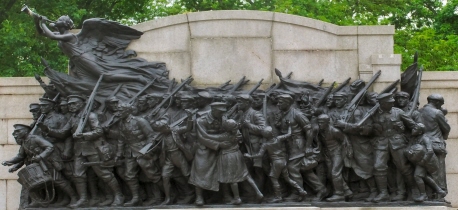Sir George Renwick
Sir George Renwick MP was first elected for the Conservatives in 1900. He was a wealthy ship owner who sat for various Newcastle seats up until 1922. He was raised to the peerage in 1921. Remarkably all five of his sons served in the First World War and survived, a factor that compelled him to a commission a war memorial for those soldiers not so fortunate. The eldest, Acting Colonel John Renwick, raised a regiment for the horse transport company and took his pack of hounds with him to France. His brothers William and Gustav were both majors in the 18th Northumberland Fusiliers and Captain George Renwick junior served in the Royal Horse Artillery Transport. Sir George's seventh child, Captain Septimus Renwick was with the Royal Scots and won the Military Cross. The fourth son, Gustav, later became MP for Stretford, 1931–1935.
The Pal Battalions
As a pre-eminent Newcastle man Sir George Renwick is remembered for his action in promoting Pals battalions, as part of an initiative by Lord Kitchener to encourage recruitment. The thinking was that if men knew they would be serving with friends, they would be more likely to enlist. However, no one foresaw the huge casualty rate which meant that whole towns were devastated by concentrated losses in battle. By the end of September 1914 over 50 towns and cities had created Pals Battalions. These included transport, cyclist and sports battalions.
Local MPs were heavily involved in the raising of volunteer battalions. The Parliamentary Recruiting Committee was set up at the start of the War, and chaired by the Prime Minister, Herbert Asquith. It used local political party associations to form a network which campaigned through the circulation of leaflets, posters and organising rallies and events. The PRC was responsible for many of the iconic recruitment posters associated with the First World War.
On 2 September 1914 Renwick suggested to the Newcastle and Gateshead Chamber of Commerce that they offer a battalion of men from local businesses. The Newcastle Commercials were formed within 8 days, the first Pals battalion to be raised in the north of England by civilian effort. Sadly it lost 350 men subsequently on the first day of the Battle of the Somme on 1 July 1916, from a normal battalion strength of 1,000.
Support for female workers
One of Renwick's first contributions during the war was to raise the issue of the treatment of women having taken on key roles during WW1. Despite their efforts in supporting the war effort, most women were summarily dismissed following the end of the conflict. In April 1915, he asked the Secretary of State for War:
"whether he is aware that nurses who have been employed during the War are being discharged with as little as twenty-four hours' notice and without receiving a railway warrant to enable them to reach their homes, find in some cases without a settlement of the bonus which was promised to them; and whether, in consideration of the splendid services performed by them during the War, and the difficulty of finding employment, it can be arranged to give them a month's pay in addition to the bonus in cases where they are demobilised at short notice?"
Roles performed by women during WW1 included tram drivers, postal workers, carrying out police patrols and producing armaments in the munitions factories. Women earned far less during the war than men who had previously undertook the same job.
Newcastle War Memorial
Also, importantly, Renwick was responsible for commissioning and paying for an imposing war memorial in Newcastle, known as 'The Response'. As stated by the memorial itself "this evocative sculpture is thought to focus on the massing of the soldiers of the Fifth Northumberland Fusiliers in April 1915. Led by 'Drummer Boys' they marched from their camp in Gosforth Park down the Great North Road, through the Haymarket and on to the central station…The battalion's route was lined with well-wishers and their parents, wives and children, some cheering, some weeping."
The narrative of the sculpture with soldiers marching off to war is watched overhead by an angel blowing a trumpet. The sculptor, Sir William Goscombe John, was responsible for creating some of the finest war memorials in the UK.

'The Response' was unveiled by the Prince of Wales as part of a visit that he made to the city in July 1923. A guard of honour was made by Northumberland Fusiliers, and attendees included blind ex-servicemen and a large crowd.
The War Memorial is a Grade I listed monument. After restoration work was completed a rededication ceremony was held on Thursday 25 October 2007. The Duke of Edinburgh was present, as well as four generations of the Renwick family who had originally given the gift of the memorial and many members of the public. The memorial later featured in Royal Mail's First World War Centenary 2014 stamp edition.
Sir George Renwick